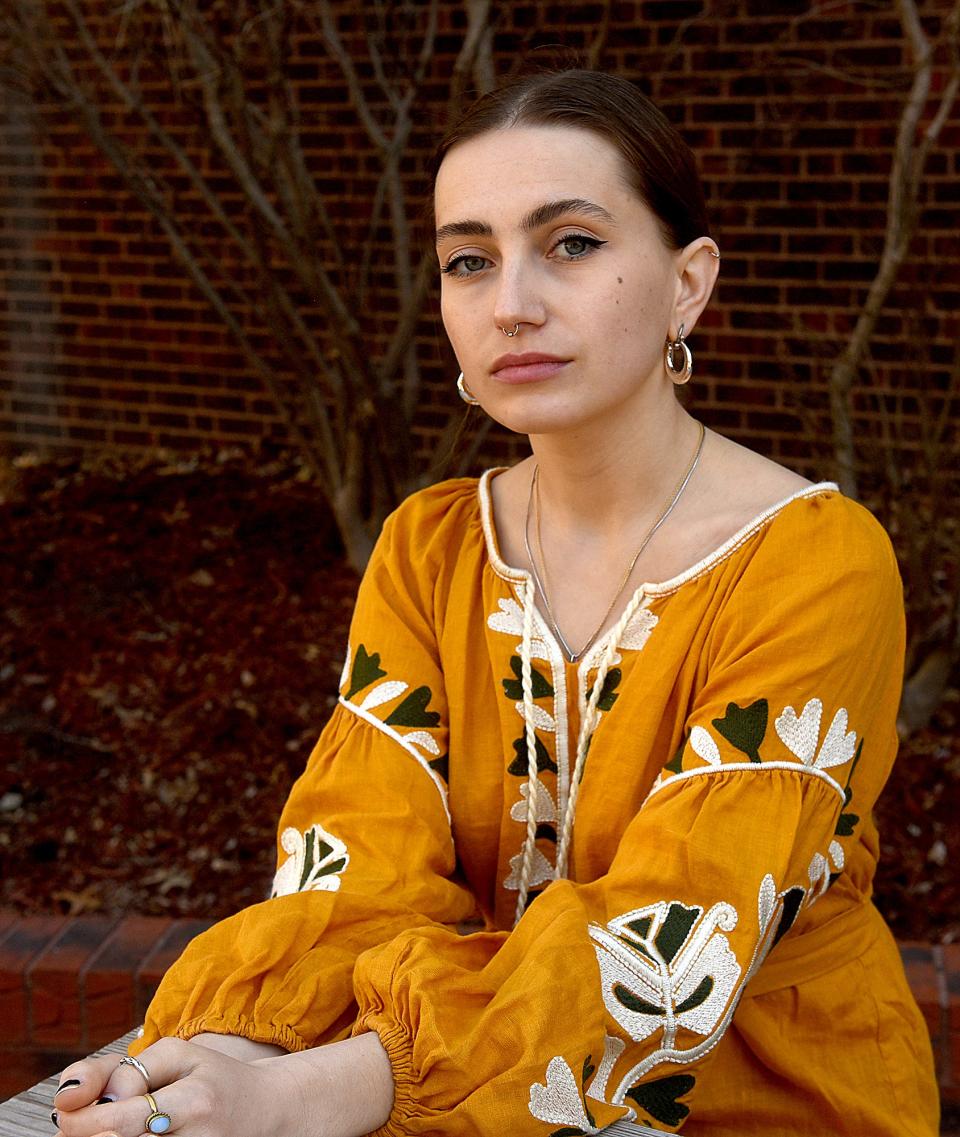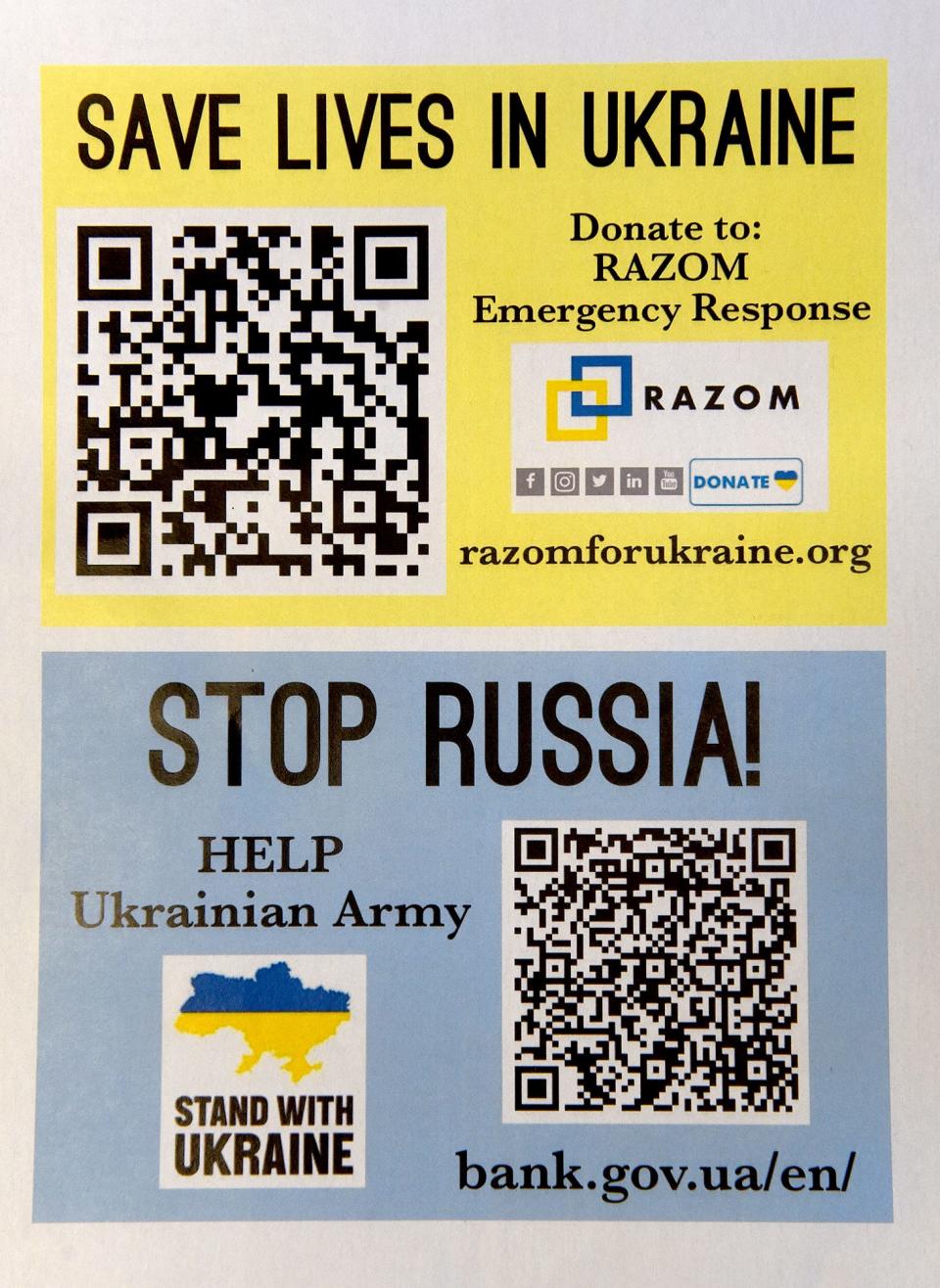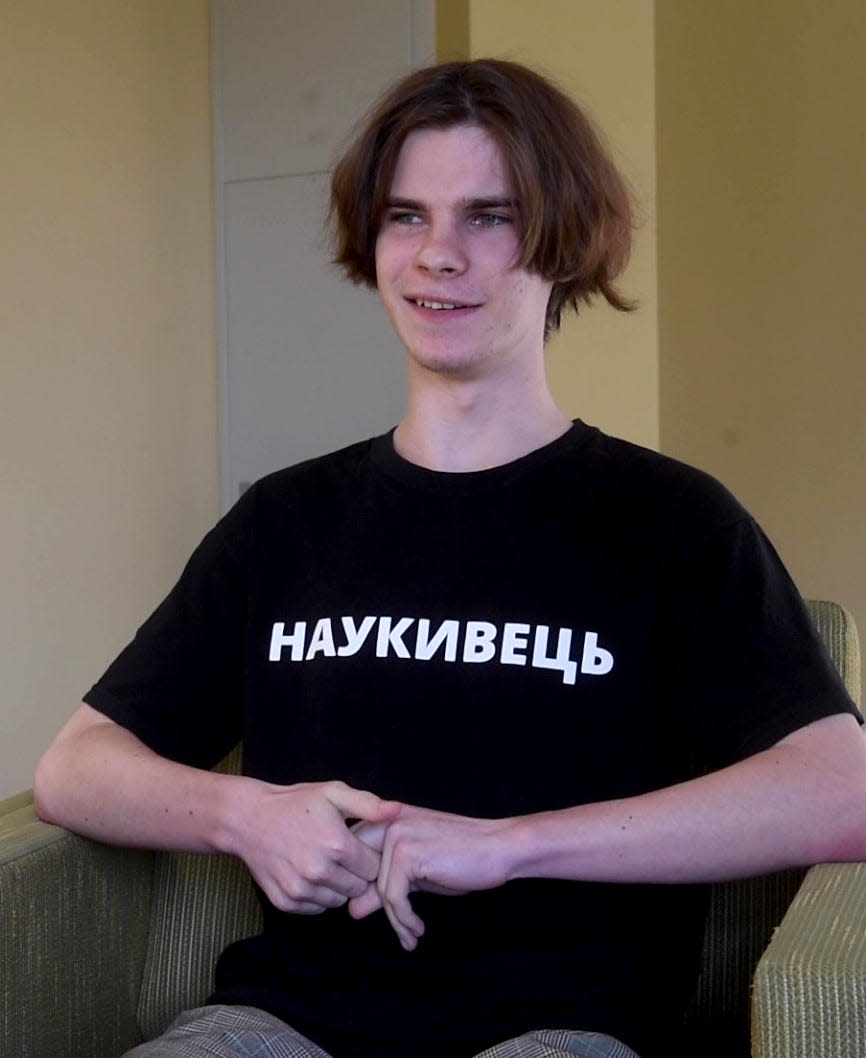Missouri Ukrainian student joins other 'Fulbrighters' to raise money for Ukraine humanitarian aid
- Oops!Something went wrong.Please try again later.
A University of Missouri student is part of an effort among elite students like her to raise money for Ukraine, their homeland, as it is relentlessly attacked by Russia.
Irynka Hromotska, 26, is a first-year graduate student in photojournalism at MU and a Fulbright Scholar. The Fulbright Foreign Student Program brings graduate students, young professionals and artists from abroad to study and conduct research in the United States.
Humanitarian aid for Ukraine
Hromotska has connected with "Fulbrighters" in six other states for a fundraiser for humanitarian aid for Ukraine.
"We're going to gather our effort," Hromotska said.
More than $12,000 has been collected so far, she said Thursday.
Hromotska spoke outside University Place Apartments, wearing a traditional vyshyvanka embroidered top and her grandmother's scarf.

The fundraising effort is being coordinated through the Ukrainian Association of Washington State, which already had not-for-profit status as a charity. The PayPal page gives donors the option of donating for medical supplies and hospitals in Ukraine; providing civilian territorial defense units defending their neighborhoods with body armor; supporting civilians in life-saving tactical medicine; helping internally displaced families and orphans; or wherever there is the greatest need.
The primary organizers are Olena Bidovanets (University of Washington) and Mykhailo Ivashchenko (University of Nebraska-Lincoln), Hromotska said.
Shattered nerves in Lviv
Hromotska is from Lviv, in western Ukraine, 43 miles from the Polish border, where most of her family and her partner remain.
"This is the city of my heart," she said.
Her mom and sister decided to leave, she said.
"My mom and my sister left to Poland," Hromotska said. "... They really didn't want to. There was a bombing near the city. They want to come back."
She is in touch by phone regularly with other family in Lviv.
"They describe it as very nerve-wracking," Hromotska said. "Every day for the past 22 days, there are air alarms. Their nerves are shattered. They can't sleep. We've shifted toward more marathon mentality than sprint mentality."

After the interview, Russian missiles struck a military aircraft repair facility near the Lviv airport, the westernmost attack on Ukraine so far.
The attack isn't surprising, Hromotska wrote in a text message on Friday. It was only a question of when, not if, Lviv would be targeted.
Her life also has turned upside down, she said Thursday.
"It does seem very real," Hromotska said. "I didn't go to my classes for the past couple of weeks. I'm always following the news or on the phone with loved ones."
Her professors have been very understanding, she said.
"They gave me extensions on my assignments," she said. "I appreciate their support."
She's working with professors to put together an exhibition of the work of Ukrainian photographers as early as next week in the Reynolds Journalism Institute at MU.
"It's going to be great," she said.
Theater bombing in Mariupol
Hromotska and fellow MU Ukrainian student Vlad Sazhen mentioned the humanitarian crisis in Mariupol, where Russians on Wednesday bombed a theater being used as a bomb shelter. It was clearly marked "children" on the ground outside.
"Even with that, they targeted it," Hromotska said. "Just the way Russian troops are targeting civilians right now is a true genocide."
Sazhen had the same opinion.
"There's a Ukrainian genocide right now in Mariupol," he said.

Zelenskyy addresses Congress
Ukrainian President Volodymyr Zelenskyy's speech to Congress on Wednesday was impressive, she said.
"I think President Zelenskyy right now is the true leader of the free world," Hromotska said.
Sazhen also was impressed by Zelenskyy. Sazhen spoke Thursday in Galena Residence Hall.
"It was brilliant," Sazhen said of the speech. "The video he showed was heartbreaking. I'm proud of my president. He's doing a good job."
'A lot of cats to feed'
It was a week during which Russia bombed the school he attended in his hometown of Kharkiv, on the eastern border of Ukraine, Sazhen said.
Sazhen wore a T-shirt that he said makes fun of a pro-Russian member of the Ukrainian government.
Sazhen's parents, little sister and girlfriend all are in what is still relative safety in Poltava in central Ukraine.
"They're safe," he said. "They have food and other needs, unlike people in Kharkiv. Right now, it's relatively calm."
His grandmother remained behind in besieged Kharkiv, he said.
"She refused to go," Sazhen said. "She's extremely stubborn."
Her reason?
"I have a lot of cats to feed," Sazhen said, quoting her excuse.
She has 10 cats, but only two of them live inside with her, he said.
His friend in territorial defense is doing well, Sazhen said.
Sazhen, 19, is an exchange student, at MU only this semester. He's researching options about what's next.
"We were thinking of getting me to Germany," Sazhen said. He knows German, but it's not easy to get in the country, he said.
He could apply for protected status but then he would have to remain in the U.S. and his girlfriend couldn't join him here, he said.
He also was making inquiries about the University of Alberta in Canada.
"I think I will go back to Ukraine," he said after listing his other options. It would require him to travel to Poland and take a bus into Ukraine, he said.
Ukrainian resistance
The terms some media organizations use are troubling, Hromotska aid.
"The informational front line is as important as the actual front line," she said. "It's not crisis. It's not conflict. It's Russian war against Ukraine."
She dislikes terms like "Ukraine crisis," she said. Add to that the huge effort of propagandists in Russia to plant disinformation.
The strong Ukrainian resistance to Russian military aggression should be expected, Hromotska said.
"The history of Ukrainian resistance goes back more than 300 years ago," she said.
First it was resistance to the Russian Empire, then resistance to the Soviet Union.
"The resistance is in our blood," Hromotska said.
This will be the last time Russia's military strays into Ukraine, she said.
Roger McKinney is the education reporter for the Tribune. You can reach him at rmckinney@columbiatribune.com or 573-815-1719. He's also on Twitter at @rmckinney9.
This article originally appeared on Columbia Daily Tribune: Humanitarian aid for Ukraine is goal of Fulbright Scholars' fundraiser

